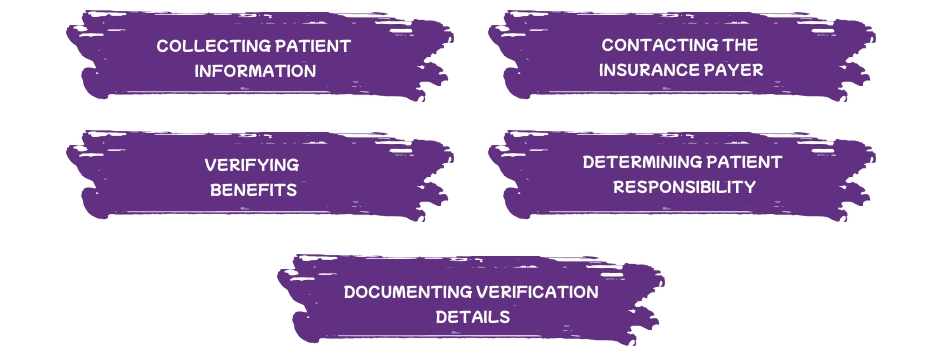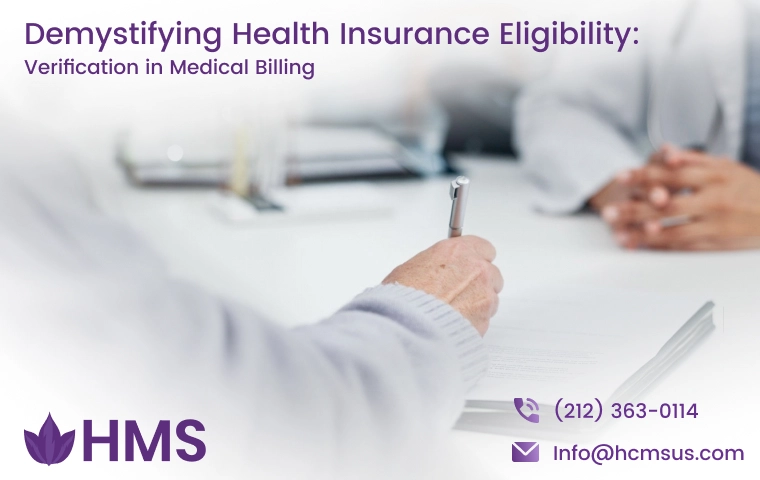The insurance eligibility and verification process is pivotal inaccurate medical billing. As a health care provider, it is important to ensure that your patients have valid health insurance coverage and benefits before providing any medical services. This not only helps in avoiding claim rejections but also ensures timely payment for the services rendered.
In this blog post, we will explore the concept of medical insurance eligibility verification, understand its significance, and uncover the benefits it offers to both healthcare providers and patients.
What Is Medical Insurance Eligibility Verification?
Medical insurance verification is a crucial step in medical billing. It involves determining the patient's insurance coverage and whether the insurance payer will cover the services provided. This process helps determine the coverage criteria and the patient's financial responsibility.
Having patent eligibility and benefits verification upfront gives the idea to the healthcare provider and patients about the insurance payer's coverage for a medical procedure. It helps avoid any confusion or surprises later on and ensures that the patient receives timely and accurate billing.
Why Patient Health Insurance Verification is Important?
Patient eligibility verification is the first step in the medical billing process, and it plays a significant role in ensuring successful claims processing. Here are some reasons why insurance eligibility verification is critical for healthcare providers:
-
Incorrect or incomplete patient information can lead to claim denials, resulting in delayed payments and increased administrative costs. By verifying insurance eligibility early on, healthcare providers can avoid such instances.
-
Verifying insurance eligibility beforehand allows healthcare providers to identify any potential issues and address them before providing medical services. This ensures timely payment, reducing the financial burden on both patients and healthcare providers.
-
With the complexity of insurance policies and regulations, it is easy to make billing errors that can result in claim rejections or delays in payment. By verifying insurance eligibility, healthcare providers can ensure accurate and timely billing.
Understanding the Insurance Eligibility Verification Process
The process of insurance eligibility verification involves collecting and confirming the patient's demographic information, insurance coverage details, and benefits. It typically includes the following steps:

-
Collecting Patient Information: The first step in the verification process is to collect all relevant information from the patient, including their name, date of birth, insurance ID number, and contact information.
-
Contacting the Insurance Payer: Once the patient's information is collected, the healthcare provider contacts the insurance payer to verify coverage details such as plan type, deductibles, co-pays, and any pre-existing conditions or exclusions.
-
Verifying Benefits: After verifying the insurance coverage, the next step is to verify the patient's benefits. This includes understanding what services are covered under the plan and any limitations or restrictions.
-
Determining Patient Responsibility: Based on the insurance coverage and benefit verification, healthcare providers determine the patient's financial responsibility for the services rendered.
-
Documenting Verification Details: It is crucial to document all verification details and keep them in the patient's medical record for future reference.
Authorization information in Patient Insurance Verification
Another aspect of insurance eligibility verification is obtaining authorization for certain medical procedures. Depending on the insurance payer's policies, some services may require prior authorization before they can be performed. This involves submitting a request to the insurance payer with all relevant documentation and waiting for approval before proceeding with the service.
Authorization requirements vary by insurance company and plan, so it is essential to stay updated on the latest policies and procedures to ensure timely approval.
Benefits of Insurance Eligibility Verification for Healthcare Providers and Patients
Insurance eligibility verification offers numerous benefits to both healthcare providers and patients. Some of these include:
For Healthcare Providers:
-
Improved Cash Flow: By verifying insurance eligibility upfront, healthcare providers can avoid delayed or denied payments, improving their cash flow.
-
Increased Efficiency: With accurate and timely billing, healthcare providers can increase their efficiency and reduce administrative costs associated with claim rejections or delays.
-
Reduced Denials: Insurance eligibility verification helps identify any potential issues that may lead to claim denials, allowing healthcare providers to address them before submitting the claim.
For Patients:
-
Transparency in Billing: By verifying insurance eligibility beforehand, patients are aware of their financial responsibility, avoiding any surprises or confusion in the billing process.
-
Timely Payment: With accurate and timely billing, patients can avoid delayed payments and potential collections issues that may impact their credit score.
Best Practices for Insurance Eligibility Verification
To ensure a smooth insurance eligibility verification process, healthcare providers should follow these best practices:
-
Collect all relevant patient information upfront to avoid any delays in the verification process.
-
Stay updated on insurance payer policies and procedures to ensure accurate verification of coverage and benefits.
-
Document all verification details for future reference, including authorization information if required.
-
Utilize electronic eligibility verification tools to streamline the process and reduce administrative costs.
HMS USA LLC For Insurance Eligibility Verification Services
HMS USA LLC is a leading provider of medical billing services, including insurance eligibility verification. We understand the complexities of insurance policies and regulations and have an experienced team dedicated to verifying patient insurance eligibility accurately and efficiently.
Our services include collecting patient information, contacting insurance payers for coverage and benefit verification, obtaining authorization if required, and documenting all verification details. With our expertise in insurance eligibility verification, we can help healthcare providers reduce billing errors, improve cash flow, and increase efficiency.
Conclusion
Insurance eligibility verification is a critical process in medical billing that helps ensure timely payments and reduces financial burdens for both healthcare providers and patients. By following best practices and utilizing the services of a reputable company like HMS USA LLC, healthcare providers can navigate the complexities of insurance policies and regulations with ease, ultimately improving their bottom line and patient satisfaction.
So, it is essential to prioritize insurance eligibility verification in the medical billing process for a successful healthcare practice. It not only ensures timely payments but also helps in building a transparent and trustworthy relationship.
FAQ! Need Help?
Not performing insurance eligibility verification can lead to delayed or denied payments, increased administrative costs, and patient dissatisfaction. It may also result in claim denials and potential collection issues for patients.
Insurance eligibility and benefits can be verified by collecting patient information, contacting the insurance payer, verifying benefits, determining patient responsibility, and documenting all details. It is also beneficial to utilize electronic verification tools and stay updated on insurance payer policies.
No, authorization requirements vary by insurance company and plan. Some services may require prior authorization, while others may not. It is essential to check with the specific insurance payer to determine if authorization is needed before proceeding with a medical procedure.
The first step in patient eligibility verification is to collect all relevant patient information, including insurance policy details and primary care physician. This information will be used to contact the insurance payer for coverage and benefit verification.
Some insurance payers may offer online eligibility verification tools for healthcare providers to use at no cost. However, it is crucial to ensure the accuracy and reliability of the information obtained through these tools.
ABOUT AUTHOR

Joseph Shahab
As a blog writer with years of experience in the healthcare industry, I have got what it takes to write well researched content that adds value for the audience. I am a curious individual by nature, driven by passion and I translate that into my writings. I aspire to be among the leading content writers in the world.
